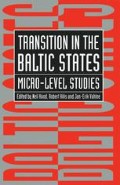Abstract
In order to study the growth of the hidden economy, two different approaches could be adopted. First it would be possible to draw on the experience of other states, former socialist states in particular, to try to define the role of the shadow economy by deploying statistical methods and opinion polling. Alternatively, the focus could be on the social background of the phenomenon and on the factors that facilitate the spread of the hidden economy. This study has adopted the latter approach as cogni-tively more important. It therefore does not set out to determine the specific scope of the shadow economy but to describe the potential reasons for its emergence in Estonian economic life. Being aware of the aspects of life and the economic spheres which are most exposed to hidden activities, it is possible to advise on policies aimed at curbing illegal activity.
Access this chapter
Tax calculation will be finalised at checkout
Purchases are for personal use only
Preview
Unable to display preview. Download preview PDF.
References
Annus, T. and Noorkõiv, R. (1994) Eesti teel turwnajandusele Estonian path to the market economy, (Tallinn: Ministry Social Affairs).
Camagni, R. and Capellin, R. (1981) ‘Policies for full employment and more efficient utilisation of resources and new trends in European regional development’, Lo Spectorale Internazionale, 2, 99–135.
Cassel, D. (1982) ‘Shattenwirtschaft — eine Wachtumbranche?’ List Forum, 11 (6).
Cassel, D. (1984) ‘The Growing Shadow Economy: Implications for Stabilisation Policy’, Inter Economics, 5, 220.
Castells, M. and Portes, A. (1989) ‘World Underneath: The Origins, Dynamics and Effects of the Informal Economy’, in A. Portes, M. Castells, and L.A. Benton, (eds), The Informal Economy (Baltimore: Johns Hopkins University Press).
Ciesnocinska, M. (1993) ‘The Polish Baltic Regions under Transition Process’, paper presented at the European Summer Institute in Regional Science, Joensuu.
Estonian Economic Survey (1994) Ministry of Economic Affairs of the Republic of Estonia, Tallinn.
Farago, L. (1993) ‘Regional Disparities and Regional Development Endeavours in Hungary under Transition’, paper presented at the European Summer Institute in Regional Science, Joensuu.
Feige, E.L. (1990) ‘Defining and Estimating Underground and Informal Economies: The New Institutional Economic Approach’, World Development, 18 (7), 989–1002.
Gabor, L.R., (1979) ‘The second economy’, Acta Oeconomica, 22 (3-4), 263–300.
Gabor, LR. (1991) ‘Prospects and limits to the second economy’, Acta Oeconomica, 43 (3-4) 1991, 349–52.
Kornai, J. (1980) The Economics of Shortage (Amsterdam: North Holland).
Kornai, J. (1992) Tee vabasse majandusse Path to the free economy (Tallinn: Eesti Entsüklabeediakirjastus).
Kornai, J. (1992) Vastuoludja dilemmad Contradictions and dilemmas (Tallinn: Olion).
Mingione, E. (1994) ‘Life Strategies and Social Economies in the post-fordist age’, International Journal of Urban and Regional Research, 18 (1), 23–44.
OECD Economoc Outlook (1982) Occasional Studies (Paris: OECD).
Portes, A. (1994) ‘Paradoxes of the Informal Economy: The Social Basis of Unregulated Entrepreneurship’, in N.J. Smelser and R. Swedberg, (eds), The Handbook of Economic Sociology (Russell Sage Foundation and Princeton University Press).
Raagmaa, G. (1995) ‘New Enterprises and Regional Development in Estonia’, in M. Tykkyläinen (ed.), Local and Regional Development During the 1990s Transition in Eastern Europe, (Aldershot, Hants: Avebury).
Raig, I. (1987) Teie pere majapidamine The household of your family (Tallinn: Valgus).
Raig, I. (1988) Teisene majandus, Secondary economy (Tallinn: Valgus).
Riigikontroll, 1994 1993 tööaruanne, (Tallinn: Riigikontroll).
Remmel, M. (1994) Kuritegu ja majandus, kuritegu kui tehing Crime and economy, crime as a deal, Rahva Hääl, May 30 and 31.
Roberts, B. (1994) ‘Informal Economy and Family Strategies’, International Journal of Urban and Regional Research, 18(1), 6–23.
Rose, R. (1983) Getting by in Three Economies: The Resources of the Official, Unofficial and Domestic Economies (Glasgow: Centre for the Study of Public Policy).
Rose, R. (1992) Ordinary people in Public Policy (London: Sage).
Rose, R. and Maley, W. (1994) Nationalities in the Baltic States, A Survey Study (Glasgow: University of Strathclyde).
Šik, E. (1994) ‘From the Multicoloured to the Black and White Economy: The Hungarian Second Economy and the Transformation’, International Journal of Urban and Regional Research, 18(1), 46–69.
Stöhr, W. (1990) ‘Synthesis’, in W. Stöhr, (ed.), Global challenge and Local Response (London and New York: United Nations University).
Zaslavskaya, T.L (1980) ‘Economisheskoe povedenie i economisheskoe razvitie’, Serija Ekonomitsheskaja 3, 15–33.
Editor information
Copyright information
© 1997 Garri Raagmaa
About this chapter
Cite this chapter
Raagmaa, G. (1997). Growth in the Hidden Economy: The Case of Estonia. In: Hood, N., Kilis, R., Vahlne, JE. (eds) Transition in the Baltic States. Palgrave Macmillan, London. https://doi.org/10.1007/978-1-349-25394-4_8
Download citation
DOI: https://doi.org/10.1007/978-1-349-25394-4_8
Publisher Name: Palgrave Macmillan, London
Print ISBN: 978-1-349-25396-8
Online ISBN: 978-1-349-25394-4
eBook Packages: Palgrave Business & Management CollectionBusiness and Management (R0)

